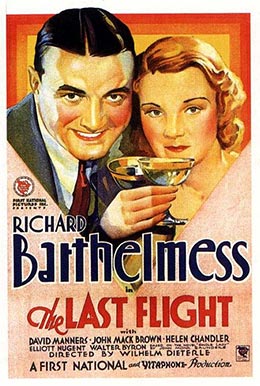
A great quote from Halliwell emerges from his description of this rare (and extremely difficult to get hold of) film:
‘Life and the movies are full of surprises. To any film buff who thinks he knows the hard-boiled, eye-to-the-main-chance style of Warner Brothers product in the thirties, nothing can be more surprising than this wry, allusive, dreamlike anecdote from the first year of the decade.’
Halliwell surpasses himself further:
‘It is slight, and short, and it leaves you just as you are becoming most interested, but being the way it is seems right for it: an accentuation of character. If a film can have a personality, this is an Elwood P. Dowd, a Kasper Gutman, a C. K. Dexter Haven*. It obeys no known rules, and it addresses the world in an extraordinary language: you can bet it got by the front office without Jack L. Warner seeing the script.’

Halliwell |
| The last Flight |
The film is about a group of ex-servicemen trying to adjust to life after the First World War. However, it would seem they are mentally devastated by the carnage they have witnessed but are unable to come to terms with it, instead involving themselves in frivolities:
‘…they are deadened by the horrors they have seen and have lost contact with the world… for them only the trivial is important… when you see the film, it feels right; we are left as stranded as the characters, beached on an inhospitable shore.’
The director William Dieterle is given credit:
‘The elegant fatalism is at once reminiscent of the classic German silents of the twenties, and it is not surprising that the director came from Ufa.**’
Halliwell appears to have had trouble tracking down research materials (as did I):
‘The Last Flight seems to have slipped past most of the critics of its day. Perhaps it was never shown to them: the publicists may have taken one look and decided that a press show would be a waste of effort.’
The film apparently has an atmosphere all of its own, being totally out of place with type of film being made at the time:
‘…hard indeed to imagine it as the product of beautiful downtown Burbank. Perhaps the trick was that for once the author of the original material was allowed to write the screenplay; and that he too was a disoriented war veteran…
* James Stewart in Harvey, Sydney Greenstreet in The Maltese Falcon and Cary Grant in The Philadelphia Story.
** The Universum Film Aktien Gesellschaft, the main German film production company from 1917 until the end of World War II.